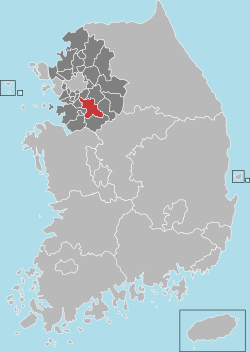
Back يونغين Arabic Yongin-si CEB Jongin Czech Yongin German Γιόνγιν Greek Jongin Esperanto Yongin Spanish یونگین Persian Yongin Finnish Yongin French
Yongin
용인시 | |
|---|---|
| Korean transcription(s) | |
| • Hangul | 용인시 |
| • Hanja | 龍仁市 |
| • Revised Romanization | Yongin-si |
| • McCune–Reischauer | Yongin-si |
 | |
 Location in South Korea | |
| Country | |
| Region | Gyeonggi Province (Sudogwon) |
| Administrative divisions | 3 gu, 4 eup, 3 myeon, 35 dong |
| Government | |
| • Type | Mayor-Council |
| • Mayor | Lee Sang-il (People Power) |
| • Council | Yongin City Council |
| Area | |
• Total | 591.32 km2 (228.31 sq mi) |
| Population (October, 2022) | |
• Total | 1,076,369 |
| • Density | 1,860.44/km2 (4,818.5/sq mi) |
| • Dialect | Gyeonggi |
| Area code | +82-31-2xx |
Yongin (Korean: 용인; Korean pronunciation: [joŋ.in]) is a city in the Seoul Capital Area, the largest in Gyeonggi Province, South Korea. With a population over 1 million, the city has developed rapidly since the 21st century, recording the highest population growth of any city in the country. Yongin is a multi-nuclear city with multiple urban centers, not a single nuclear structure, and Giheung District crosses the Yeongdong Expressway and Dongbaek, while Suji District crosses Pungdeokcheon Stream and Jukjeon.
Yongin is a city almost as large as Seoul by area, consisting of the highly urbanized districts of Suji District and Giheung District and the semi-urbanized district of Cheoin District. Yongin's urbanized districts are located close to the capital and many commute to and from downtown Seoul in approximately 30–40 minutes by car using the Gyeongbu Expressway or Yongin-Seoul Expressway, the Bundang Line subway, the Shinbundang Line subway or metropolitan buses. The Shinbundang Line with a maximum speed of 110 km/h (68 mph) extended to Suji District in January 2016, which allows Suji residents to travel to Gangnam Station in 25 minutes. The Bundang Line extended south to Giheung Station in December 2011, connecting to EverLine that extends all the way to Everland. In December 2013, the Bundang Line extended to Suwon Station of Seoul Subway Line 1.
Yongin is home to Everland and Caribbean Bay, South Korea's most popular amusement and water parks. The city is also home to the Korean Folk Village, the largest of its kind. The 12,000-capacity Yongin Stadium and the 37,000-capacity Yongin Citizen Sports Park Stadium are the largest sports venues in Yongin. Both stadiums are used mostly for football matches.

